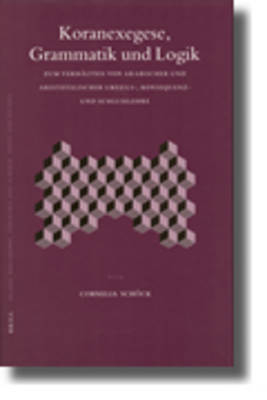
Koranexegese, Grammatik und Logik
Zum Verhältnis von arabischer und aristotelischer Urteils-, Konsequenz- und Schlußlehre
Seiten
2005
Brill (Verlag)
978-90-04-14588-7 (ISBN)
Brill (Verlag)
978-90-04-14588-7 (ISBN)
- Titel ist leider vergriffen;
keine Neuauflage - Artikel merken
This volume offers a new approach in Islamic hermeneutics and the understanding of Qur’anic exegesis, Muslim dialectical theology and the appropriation of Peripatetical logic in the Arabic world. It ranges from the 8th century up to Avicenna (11th century).
From its beginning in the 8th century Islamic dialectical theology (kalām) was increasingly influenced by Peripatetical Logic. The `orthodox’ solutions of the main problems of Muslim theology are the result of centuries of dispute between scholars arguing on the basis of grammatical and logical arguments. This volume offers a new approach in the problems of Islamic hermeneutics and the understanding of Quraʾnic exegesis, Muslim theology and the appropriation of Peripatetical logic in the Arabic world.
Subjects included are the problems of name (ism) and qualification (waṣf), condition (šarṭ) and consequence (ğazāʾ), the whole (kull) and the part (baʿḍ), the general (ʿāmm) and the special (ḫāṣṣ), expression (lafẓ) and matter (mādda), signification by expression (dalīl al-lafẓ) and signification by inference (dalīl al-ʿaql).
From its beginning in the 8th century Islamic dialectical theology (kalām) was increasingly influenced by Peripatetical Logic. The `orthodox’ solutions of the main problems of Muslim theology are the result of centuries of dispute between scholars arguing on the basis of grammatical and logical arguments. This volume offers a new approach in the problems of Islamic hermeneutics and the understanding of Quraʾnic exegesis, Muslim theology and the appropriation of Peripatetical logic in the Arabic world.
Subjects included are the problems of name (ism) and qualification (waṣf), condition (šarṭ) and consequence (ğazāʾ), the whole (kull) and the part (baʿḍ), the general (ʿāmm) and the special (ḫāṣṣ), expression (lafẓ) and matter (mādda), signification by expression (dalīl al-lafẓ) and signification by inference (dalīl al-ʿaql).
Cornelia Schöck, Dr.phil. (1993), Dr.habil. (2002) University of Freiburg i.Br., is Research Associate at the University of Cambridge,U.K. She has published widely on the history of Islamic theology and exegesis.
| Erscheint lt. Verlag | 29.11.2005 |
|---|---|
| Reihe/Serie | Islamic Philosophy, Theology and Science. Texts and Studies ; 60 |
| Verlagsort | Leiden |
| Sprache | deutsch |
| Gewicht | 1011 g |
| Themenwelt | Geisteswissenschaften ► Philosophie ► Sprachphilosophie |
| Geisteswissenschaften ► Religion / Theologie ► Islam | |
| Geisteswissenschaften ► Sprach- / Literaturwissenschaft ► Sprachwissenschaft | |
| ISBN-10 | 90-04-14588-5 / 9004145885 |
| ISBN-13 | 978-90-04-14588-7 / 9789004145887 |
| Zustand | Neuware |
| Haben Sie eine Frage zum Produkt? |
Mehr entdecken
aus dem Bereich
aus dem Bereich
Wie die Menschheit zu ihrer größten Erfindung kam
Buch | Softcover (2022)
C.H.Beck (Verlag)
CHF 25,20
Macht und Legitimität politischer Sprache im Prozess der europäischen …
Buch | Softcover (2023)
Nomos (Verlag)
CHF 103,60


